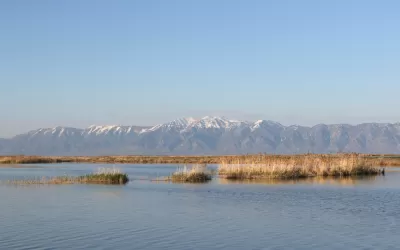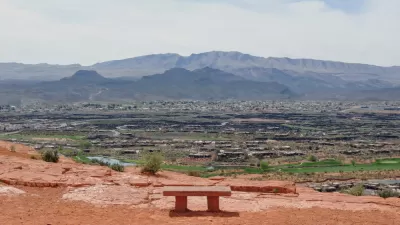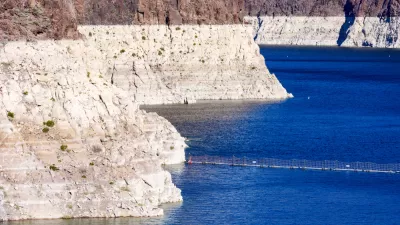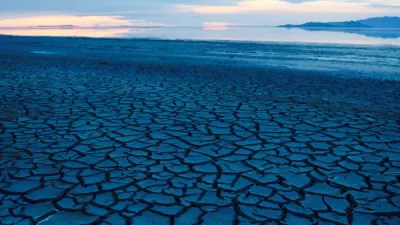The state's widespread practice of supplying unlimited untreated water to homes may be part of the reason it has to spend billions on a new pipeline and dam.

Compared to other states, Utah is among the driest, among the thirstiest, and among the fastest-growing; it's also the only state that provides, to a significant number of residential properties, "untreated agricultural water from canals, sold at an unmetered flat rate, to irrigate their lawns, gardens and landscaping."
It's called "secondary water," writes Matt Weiser at Water Deeply, and the practice stems from the unusual way that water rights in Utah developed as agricultural land gave way to residential construction.
"In nearly every other community in the nation, when farms were converted to housing the irrigation water was usually sold to other farms or allowed to remain in-stream. And new homes used treated drinking water for outdoor irrigation as well as in their kitchens and baths – all measured and billed according to a single meter at the curb."
But in Utah, 61 percent of urban water suppliers allow unlimited secondary water use, usually for $10 to $15 dollar per month.
Without meters, it's more or less impossible to obtain definitive statistics on water use in Utah, but one study did show residents of Salt Lake County—which does not supply secondary water—used 78 percent less water than residents of two neighboring counties.
Recently, the unbridled use of secondary water has been the target of criticism as Utah debates two enormous, expensive water projects. The first is a dam on the Bear River, which is the most significant tributary to the shrinking Great Salt Lake; the other is a pipeline from Lake Powell, a reservoir that has challenges of its own.
Some conservationists and fiscal conservatives would rather see the state try to reduce water use first, but both groups expect resistance. Weiser speaks to the state senator who recently introduced a bill to require meters on secondary water supplies across the entire state; the politician succinctly comments, “I can tell you right now, the cities are not going to like that.
FULL STORY: Utah, America’s Thirstiest State, Wrestles With Unmetered Water Use

Study: Maui’s Plan to Convert Vacation Rentals to Long-Term Housing Could Cause Nearly $1 Billion Economic Loss
The plan would reduce visitor accommodation by 25,% resulting in 1,900 jobs lost.

North Texas Transit Leaders Tout Benefits of TOD for Growing Region
At a summit focused on transit-oriented development, policymakers discussed how North Texas’ expanded light rail system can serve as a tool for economic growth.

Using Old Oil and Gas Wells for Green Energy Storage
Penn State researchers have found that repurposing abandoned oil and gas wells for geothermal-assisted compressed-air energy storage can boost efficiency, reduce environmental risks, and support clean energy and job transitions.

Private Donations Propel Early Restoration of Palisades Playground
Los Angeles has secured over $1.3 million in private funding to restore the Pacific Palisades playground months ahead of schedule, creating a modern, accessible space that supports community healing after recent wildfires.

From Blight to Benefit: Early Results From California’s Equitable Cleanup Program
The Equitable Community Revitalization Grant (ECRG) program is reshaping brownfield redevelopment by prioritizing projects in low-income and environmental justice communities, emphasizing equity, transparency, and community benefits.

Planting Relief: Tackling Las Vegas Heat One Tree at a Time
Nevada Plants, a Las Vegas-based nonprofit, is combating the city’s extreme urban heat by giving away trees to residents in underserved neighborhoods, promoting shade, sustainability, and community health.
Urban Design for Planners 1: Software Tools
This six-course series explores essential urban design concepts using open source software and equips planners with the tools they need to participate fully in the urban design process.
Planning for Universal Design
Learn the tools for implementing Universal Design in planning regulations.
Ascent Environmental
Borough of Carlisle
Institute for Housing and Urban Development Studies (IHS)
City of Grandview
Harvard GSD Executive Education
Toledo-Lucas County Plan Commissions
Salt Lake City
NYU Wagner Graduate School of Public Service





























